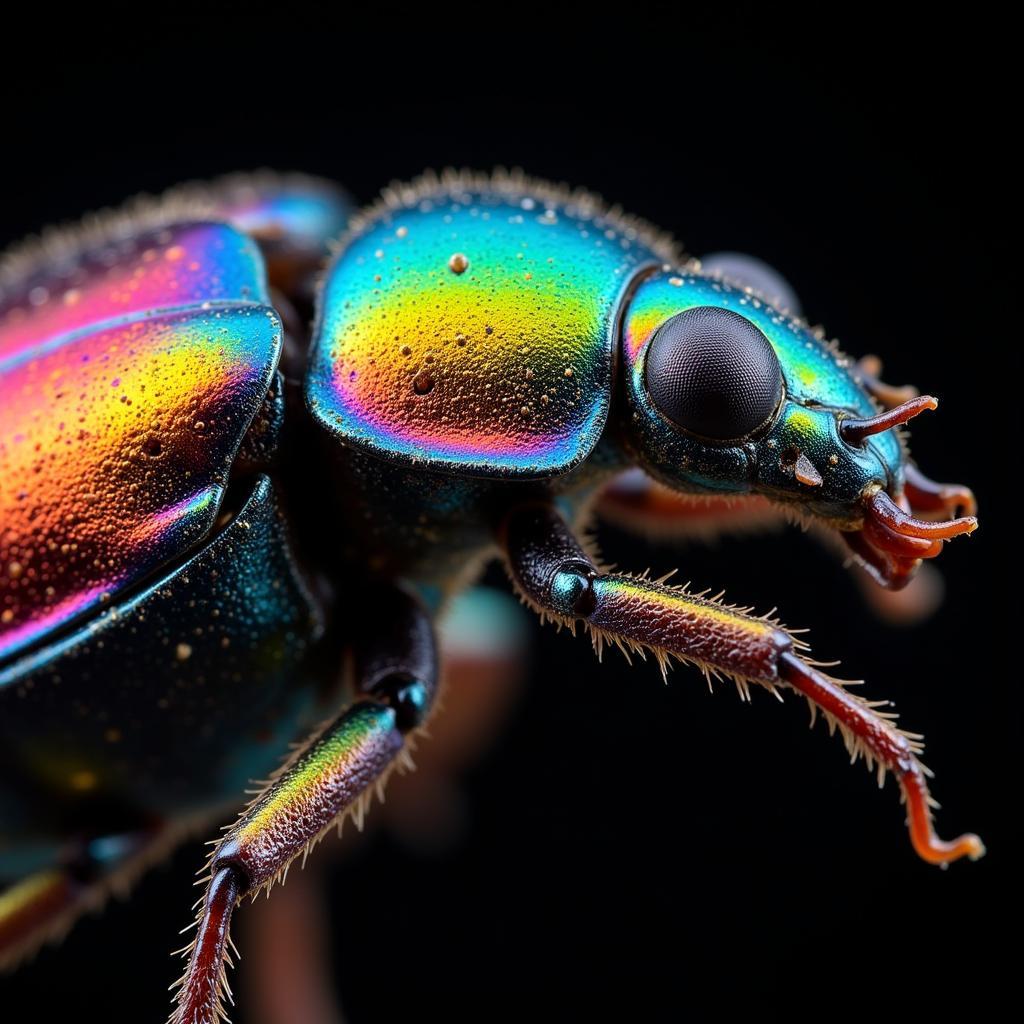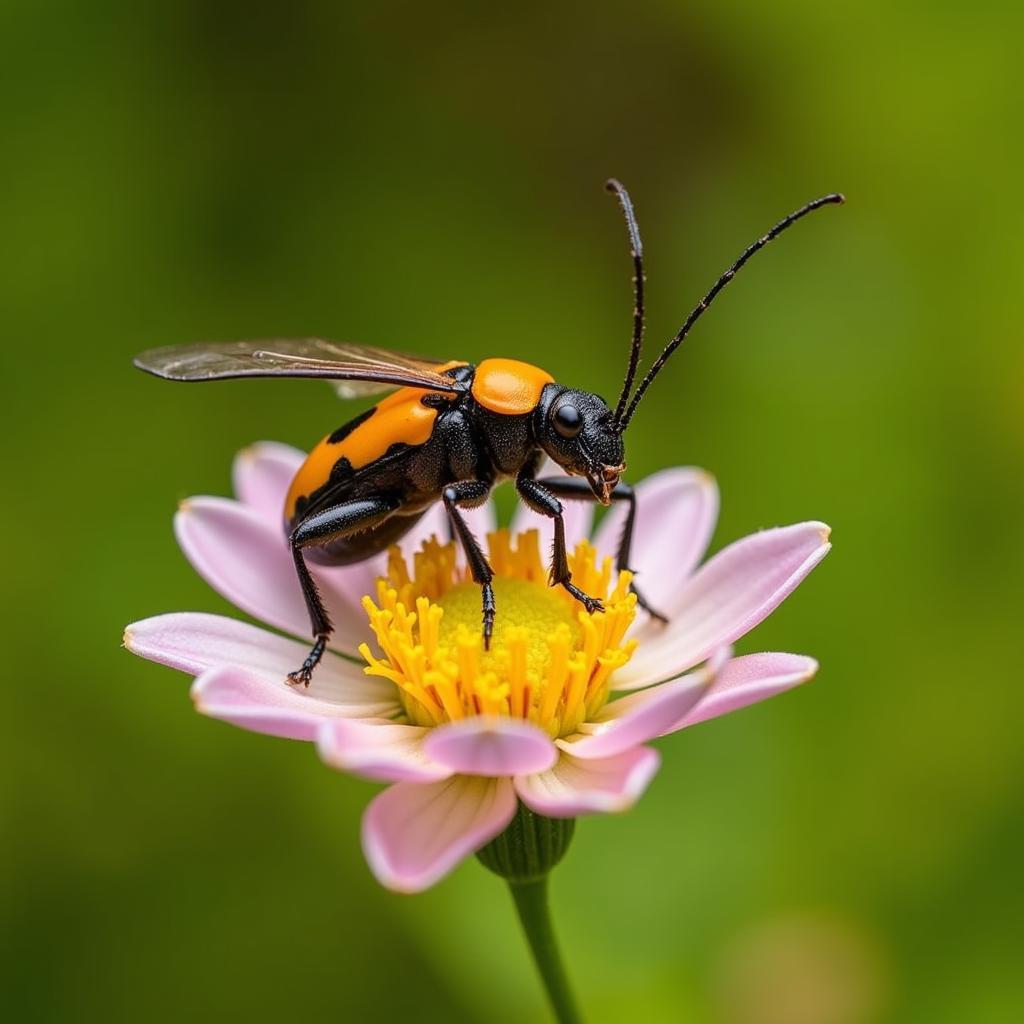African Flower Beetle: A Closer Look at These Vibrant Insects
The African Flower Beetle, a member of the Scarabaeidae family, is a stunning creature known for its bright colors and metallic sheen. These beetles, found throughout sub-Saharan Africa, are a common sight, often spotted feasting on pollen and nectar amidst blooming flowers. But there’s more to these vibrant insects than meets the eye.
Unveiling the Beauty: Physical Characteristics of African Flower Beetles
African flower beetles are relatively large, ranging from 20 to 30 millimeters in length. Their most striking feature is undoubtedly their iridescent exoskeleton, which shimmers in hues of green, gold, red, and blue. This dazzling effect is due to the microscopic structure of their cuticle, which reflects light in a way that creates the illusion of changing colors.
 African Flower Beetle Close Up
African Flower Beetle Close Up
Beyond their captivating colors, these beetles possess a robust body shape typical of scarab beetles. They have six legs, each ending in tiny claws that allow them to cling to flowers and vegetation. Their antennae are distinctive, ending in club-like structures composed of leaf-like plates. These sensitive antennae play a crucial role in detecting food sources and potential mates.
More Than Just a Pretty Face: The Life Cycle and Behavior
African flower beetles undergo complete metamorphosis, progressing through four distinct life stages: egg, larva, pupa, and adult. Females lay their eggs in decaying organic matter, providing a rich food source for the emerging larvae. These C-shaped grubs, often called “white grubs,” are voracious eaters, consuming large quantities of decomposing plant material.
After several molts, the larva pupates, entering a resting stage during which it undergoes a remarkable transformation. Finally, the adult beetle emerges, ready to mate and continue the life cycle. Interestingly, adult African flower beetles are primarily active during the day, unlike many other beetle species. They are often seen buzzing from flower to flower, using their long tongues to lap up nectar and pollen.
Ecological Importance and Interactions with Humans
African flower beetles play a crucial role in their ecosystem. As pollinators, they contribute to the reproduction of various plant species, ensuring the continuation of these plants and the animals that depend on them. Their larvae, while often considered pests in gardens, are also important decomposers, breaking down organic matter and returning nutrients to the soil.
 African Flower Beetle Pollinating
African Flower Beetle Pollinating
Despite their ecological benefits, African flower beetles can sometimes be seen as pests, particularly when their larvae damage crops or gardens. However, it’s important to remember their importance in the larger ecosystem. Understanding their life cycle and ecological contributions can help us appreciate these fascinating creatures and their place in the natural world.
Conclusion
The African flower beetle, with its captivating beauty and intriguing life cycle, is a testament to the diversity and wonder of the African insect world. These beetles, more than just aesthetically pleasing, play a vital role in their ecosystem, contributing to the health and balance of the natural world. As we continue to learn more about these fascinating creatures, we gain a deeper appreciation for the interconnectedness of life on Earth and the importance of conserving biodiversity.
FAQs
1. Are African flower beetles dangerous to humans?
No, African flower beetles are not dangerous to humans. They do not bite or sting and are generally harmless.
2. What is the lifespan of an African flower beetle?
The lifespan of an African flower beetle varies depending on the species and environmental conditions. On average, adults live for a few weeks to a few months.
3. How can I prevent African flower beetle larvae from damaging my garden?
There are several ways to prevent African flower beetle larvae from damaging your garden, including using beneficial nematodes, rotating crops, and removing decaying organic matter.
4. Where can I find more information about African insects?
You can find more information about African entomology and African insects AZ on our website.
5. Are there other fascinating beetles found in Africa?
Yes, Africa is home to a wide variety of beetles, including the impressive African horned beetle.
Need further assistance? Contact us at +255768904061, email us at kaka.mag@gmail.com, or visit our office at Mbarali DC Mawindi, Kangaga, Tanzania. Our customer support team is available 24/7 to assist you. You can also explore more captivating insights about African insects photos and African Egyptian jewelry on our website.


